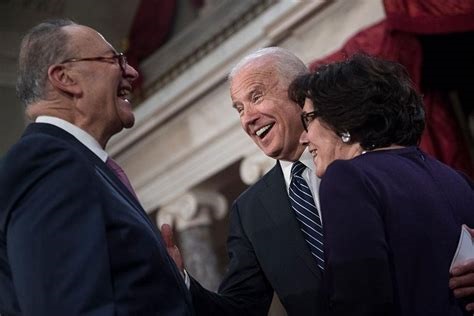Democrats will need to curtail the Senate filibuster if they aim to pass voting legislation and other priorities next, and the party’s top leaders are encouraging them to do just that.
But the effort is far from guaranteed to prevail, with President Joe Biden’s role still in doubt, and if it succeeds, may come back to bite the party just a year or two down the road.
“If the only thing standing between getting voting rights legislation passed and not getting passed is the filibuster, I support making the exception of voting rights for the filibuster,” Biden recently told ABC News, adding that he doesn’t think the Senate will “have to go that far.”
Vice President Kamala Harris added in a weekend interview with CBS that the United States risks losing its status as a role model for democracy without new federal elections laws.
“Right now, we’re about to take ourselves off the map as a role model if we let people destroy one of the most important pillars of a democracy, which is free and fair elections,” she said.
The party has introduced two bills, the John Lewis Voting Rights Advancement Act and the For the People Act, which Democrats say are needed to expand voting rights, rein in gerrymandering, and create new ethics roles for federal officeholders.
With all 50 Senate Republicans opposed to the bills, viewing them as a federal takeover of elections that would also undermine security, Democrats will need to alter a 215-year-old procedure to get them to the president’s desk.
The filibuster requires 60 votes to end debate on most bills, preventing legislation from being passed by a simple majority. Thus, some Democrats are now calling for changing or eliminating the filibuster in order to get laws passed with just 51 votes. Senate Majority Leader Chuck Schumer has indicated he will take up the voting bills as soon as the first week of January and that he will “consider changes to any rules” that stand in the way.
How would it work?
There are a number of options for Democrats, though none of them truly amount to a one-time exception. The simplest way would be to change the text of Senate Rule 22, the cloture rule requiring 60 votes to end debate. But doing so would require the support of two-thirds of senators, which isn’t going to happen in a 50-50 chamber.
A more likely scenario would involve creating a new Senate precedent. In this case, commonly known as the “nuclear option,” a senator would raise a point of order suggesting a new interpretation of the rules that elections legislation requires only a majority vote. The controversial nuclear option itself requires only a majority vote, establishing a new precedent.
“Because Democrats don’t have the votes to change it honestly, which would mean changing the text of the rule, they’d have to use the nuclear option,” said Thomas Jipping, a senior legal fellow with the conservative Heritage Foundation. “So, you’d end up with rules that say one thing, but we pretend they say another.”
Heritage Action executive director Jessica Anderson echoed Jipping’s criticisms, saying filibuster changes would amount to Democrats “assigning themselves more power than the people gave them.”
There’s recent precedent for both parties going nuclear. In 2013, then-Senate Majority Leader Harry Reid led Democrats in eliminating the 60-vote threshold to confirm presidential nominations, except for the Supreme Court. Four years later, Republicans also eliminated the threshold for Supreme Court confirmations.
Senate Minority Leader Mitch McConnell famously foreshadowed the Republican move after Democrats went for the nuclear option in 2013: “You’ll regret this, and you may regret this a lot sooner than you think.”
McConnell is once again sounding the alarm about the consequences of filibuster change, and at least two Democratic senators seem to agree with him. Arizona Sen. Krysten Sinema and West Virginia Sen. Joe Manchin, frequent thorns in the side of Democratic leadership, each have said they oppose procedural changes.
Sinema’s spokesman told Politico last week that the very voting rights bills in question could be “rescinded in a few years and replaced by a nationwide voter-ID law” or “nationwide restrictions on vote-by-mail.”
Not only would it backfire, it would be hypocritical, argued Honest Elections Project executive director Jason Snead.
Read More From The PatriotAmerican
“Manchin and Sinema have both warned their colleagues that eliminating the filibuster would be short-sighted, would fuel dysfunction, and would leave their party powerless the next time they are in the minority,” said Snead. “It would also be hypocritical, given Democrats — including many of the filibuster’s loudest detractors — have used the procedure countless times to stop legislation they disagreed with.”

